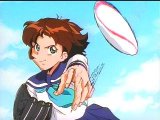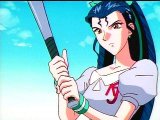

Quick Links:
Princess Nine, Volume 1
When I sit down to watch an anime or read a manga, the number one thing I look for is an appealing cast of characters. I don't care if they're fighting demons in a martial arts tournament, screaming their unrequited love's name accompanied by violin chords and windblown rose petals, or having a three-way in a spaceship while Super Happy Princess Fun Fun twirls around them in a multi-colored tutu; if the people interest me then I will watch them. But for the most part, I am sorry to say, the current crop of anime has totally failed there. As I look back on this year's new releases, I see plenty of interesting concepts and flashy visuals, but very little substance underneath. Workable archetypes have become cheap stereotypes for the story to progress, and character development is a mere afterthought.
And yet, not all too long ago (1998, in fact) the climate of anime culture was vastly different, and for the better. All the time people were producing solid character-based shows with the flimsiest of excuses to get a fun cast of vibrant personalities together. One of the best premises, in my opinion at least, was the sports team. It's a simple, believable foundation that holds an inherit goal for the collected cast to work towards: to win, preferably on a national level that involves lots of blandly drawn cheering fans. Sure, it also carries some cliches with it (the winning or near-win moment, the unorthodox coach who gets the team to bond using his/her unorthodox ways, the anonymously evil rival team, and the list goes on...) which tend to drag down lesser specimens in the genre. But, so do most other familiar genres, yet if handled properly they can all work. And "Princess Nine" works-quite well, in fact.
The story is thus: Ryo Hayakawa is a chipper young thing with a "natural" killer pitching arm who helps out her local sandlot team as a relief pitcher. Her plans to join her mother full-time at the family-run oden bar after junior high graduation are brought to an unexpected end when the chairwoman of an expensive girls' high school invites her to join under full scholarship-but only as long as she agrees to pitch for the school's newly formed girls' baseball team. At first Ryo declines due to her sense of duty, but upon some gentle encouragement from her mother and hearing that her dead father was a famous baseball player, she slowly decides to reconsider the offer. Thus she joins the team, which is "guided" by a seemingly lazy and boorish drunk, Coach Kido, and at the beginning of summer break has only three players, counting Ryo.
After the essential plot and Ryo herself as a character are firmly established, the volume then falls into the formula of Coach Kido and Ryo rounding up the rest of the players to form what will eventually be a ragtag assortment of lively personalities who all possess some sort of talent that will contribute to their role on the team (Oh Doctor, the cliche-o-meter is about to burst-what ever shall we do?). Also, romantic subplots are brewing (aren't they always?) as Ryo develops a friendship-or-could-it-lead-to-more with a baseball star bishounen who goes to the neighboring all-male high school, and gets herself a rival for his affections in Izumi, a seemingly perfect tennis star who's not only the aforementioned bishounen's best friend but also the school's chairwoman's daughter. As unoriginal as it all sounds, the characters are indeed all quite likable and fun enough to watch-due entirely due to some sharp writing-and while some members of the cast aren't nearly as fleshed out as others, that's presumably what the next few volumes will be for.
If I had to pick the one fault in "Princess Nine" that I fear will drive potential viewers away, I'd say it's the animation. It's not the least bit fluid, but then this was back when a television anime series invariably had a shoestring budget. This is especially apparent in the baseball scenes, when plays that should be presented as fairly realistic are made fantastical due to poor funds (Ryo's pitches seem far too inhumanly fast in an attempt to conserve cels). And the character designs are all too typical of its era, which I found to be quaint but would blind most of today's computer-drawn animation fans (I was particular amused with Izumi's and the chairwoman's hair. What is that-cotton candy perfectly swirled around their heads?). The music is a light and unmemorable affair.
The presentation is average. There's really not much to say here; the packaging is a little cluttered but appropriate thematically, the extras are all quite blah (a few character bios, ads, etc.), and the menus basically paste a baseball theme on top of the usual format. It's not the least bit offensive, but very vanilla nonetheless. All in all, "Princess Nine" is a delightful treasure wrapped in pathetic packaging.
In closing, watch "Princess Nine." It's fun, light, warmhearted, and certainly the type of show the anime world needs more of. The set-up is well worn but executed nicely, and I'm very interested in checking in with these characters in future editions. Also, interest in the sport itself is entirely not necessary to like the series, as instead it's all about the characters wearing the uniforms (or those close to those wearing the uniforms) themselves. To steal a gloriously terrible pun from the case, (baseball) diamonds ARE a girl's best friend.
Distributor: ADV Films Creator: Sunrise / Sotsu Agency Released: 1998
Video Quality: B+ Audio Quality: B+ Presentation: B Content: A- Overall: B+



